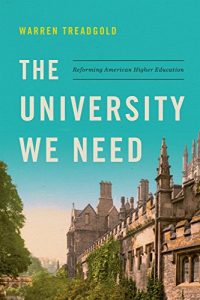
“Higher education is in a lot of trouble, barely kept on track by massive price increases, grade inflation that keeps the mostly inattentive customers sedated, and a class of academic serfs, called adjuncts, who work for meager wages…. And what does the money buy?”
Not much, according to Warren Treadgold, author of a new book, The University We Need, which is reviewed by Minding the Campus editor John Leo in today’s Wall Street Journal.
Although the book touches on some familiar themes, Leo’s review highlights some of Treadgold’s more controversial and interesting findings. Read the review here.
I wonder if Professor Treadgold is talking about his own St. Louis University, where the tuition and fees are at least nominally not much short of those at Harvard, maybe 93%.
Anyhow, I wasn’t able to read John Leo’s piece behind the WSJ paywall (I let my subscription lapse some time ago). So I went to the Amazon site, found this:
“he proposes federal legislation to monitor the quality and honesty of professors and to limit spending on administration to no more than 20 percent of university budgets (Harvard now spends 40 percent).”
This strikes me as a horrid idea for too many reasons to list. And his further idea to start a new elite university that would be different from what we already have, that would welcome moderates and conservatives along with liberals and leftists, strikes me as rather naive. First of all, don’t places like the University of Chicago, Caltech sort of fit the bill already? Both those places could use the dough it would take to start a new university from scratch. Second, I am doubtful that the new university would be more successful than most of the old in resisting what seem like almost unstoppable forces. (I know, that sort of contradicts what I just said about a couple of distinguished schools that also are something of outliers. But that sort of supports my point that the money might be better placed at schools that already exist and seem to have a track record.)
The limiting of administrative positions, in universities and K-12 schools, is a good idea. Less administrators means less wacky programs and less internal agendas, more plain old teaching and research overseen only by professional peers.
Thank you for an interesting review of “The University We Need.” I completely agree with Warren Treadgold’s thesis–founding a “new university” may be the only solution. It is unalterably clear that America’s universities have been co-opted by the far left and a college “education” is no longer worth the expense. However, I was surprised Treadgold did not mention Hillsdale College as a template for the university he proposes. Hillsdale is the polar opposite of today’s typical university and (as of now) the sole beacon of hope.(I have no connection to Hillsdale College, having graduated from the University of Redlands, a small, private college that has also been corrupted by leftist ideology. But I admire Hillsdale’s unswerving belief in America’s ideals–since 1844!)
I’m wondering how the debate teams function in the postmodern university. Remember in the old days, a topic would be presented, such as, “Resolved: Capital punishment should be ended.” One team would take the affirmative and the competing team would take the negative. But now there is only one side permitted in controversial ideas–which are now no longer controversial at the university. The team that in former days would have argued the now politically incorrect side would today be charged as thought criminals and subjected to disciplinary proceedings and rehabilitation–even though they might protest that they didn’t really hold that viewpoint. One of the foundational ideas underpinning the old debate structure was that to have an informed and reasonable commitment to an idea, one must know and understand the arguments against it as well as for it.
I got a glimpse of how “debate” teams now function, and it came as quite a shock, since I once participated on a team myself. My faculty office is next to classrooms where a debate meet was being held one weekend several weeks ago. I was surprised to hear a guy screaming, his rant peppered with F-bombs, so I went and peered into the classroom to see what was going on. The room was filled with young people in very prim attire, and the young man “debating” was standing in front, the veins on his face bulging as he rendered his social justice “oratory.” And his presentation–of you could call it that–was typical of the entire morning. It seems that what we used to call “forensics teams” back in my day are now just theater; the participants do not reason, just emote. Perhaps they are judged on how impassioned their emoting is. Are these our future attorneys?
The real old-style debate is called “Parliamentary Debate”. There are other ones “XYZ Debate” that range from limp to ridiculous.
Nowadays I expect the teams take turns denouncing anyone opposing the correct political line, and the most fervent denunciation wins. Either that or they all start clapping once the topic is announced, and whoever stops clapping first gets sent to the gulag.